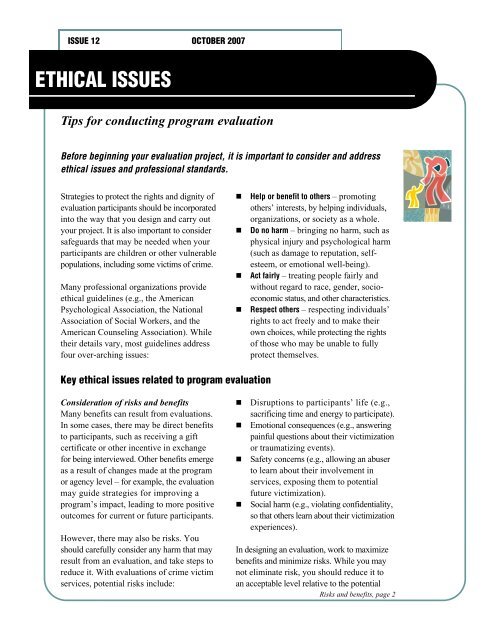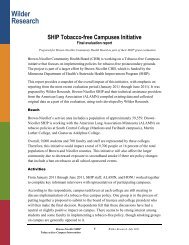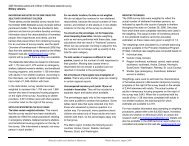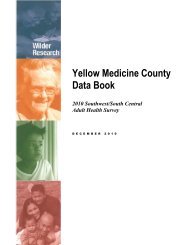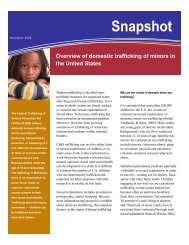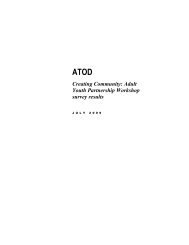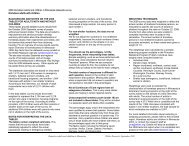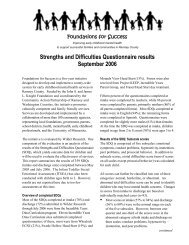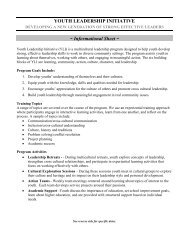Tips for conducting program evaluation. - Minnesota Department of ...
Tips for conducting program evaluation. - Minnesota Department of ...
Tips for conducting program evaluation. - Minnesota Department of ...
Create successful ePaper yourself
Turn your PDF publications into a flip-book with our unique Google optimized e-Paper software.
ISSUE 12<br />
OCTOBER 2007<br />
ETHICAL ISSUES<br />
<strong>Tips</strong> <strong>for</strong> <strong>conducting</strong> <strong>program</strong> <strong>evaluation</strong><br />
Be<strong>for</strong>e beginning your <strong>evaluation</strong> project, it is important to consider and address<br />
ethical issues and pr<strong>of</strong>essional standards.<br />
Strategies to protect the rights and dignity <strong>of</strong><br />
<strong>evaluation</strong> participants should be incorporated<br />
into the way that you design and carry out<br />
your project. It is also important to consider<br />
safeguards that may be needed when your<br />
participants are children or other vulnerable<br />
populations, including some victims <strong>of</strong> crime.<br />
Many pr<strong>of</strong>essional organizations provide<br />
ethical guidelines (e.g., the American<br />
Psychological Association, the National<br />
Association <strong>of</strong> Social Workers, and the<br />
American Counseling Association). While<br />
their details vary, most guidelines address<br />
four over-arching issues:<br />
• Help or benefit to others – promoting<br />
others’ interests, by helping individuals,<br />
organizations, or society as a whole.<br />
• Do no harm – bringing no harm, such as<br />
physical injury and psychological harm<br />
(such as damage to reputation, selfesteem,<br />
or emotional well-being).<br />
• Act fairly – treating people fairly and<br />
without regard to race, gender, socioeconomic<br />
status, and other characteristics.<br />
• Respect others – respecting individuals’<br />
rights to act freely and to make their<br />
own choices, while protecting the rights<br />
<strong>of</strong> those who may be unable to fully<br />
protect themselves.<br />
Key ethical issues related to <strong>program</strong> <strong>evaluation</strong><br />
Consideration <strong>of</strong> risks and benefits<br />
Many benefits can result from <strong>evaluation</strong>s.<br />
In some cases, there may be direct benefits<br />
to participants, such as receiving a gift<br />
certificate or other incentive in exchange<br />
<strong>for</strong> being interviewed. Other benefits emerge<br />
as a result <strong>of</strong> changes made at the <strong>program</strong><br />
or agency level – <strong>for</strong> example, the <strong>evaluation</strong><br />
may guide strategies <strong>for</strong> improving a<br />
<strong>program</strong>’s impact, leading to more positive<br />
outcomes <strong>for</strong> current or future participants.<br />
However, there may also be risks. You<br />
should carefully consider any harm that may<br />
result from an <strong>evaluation</strong>, and take steps to<br />
reduce it. With <strong>evaluation</strong>s <strong>of</strong> crime victim<br />
services, potential risks include:<br />
• Disruptions to participants’ life (e.g.,<br />
sacrificing time and energy to participate).<br />
• Emotional consequences (e.g., answering<br />
painful questions about their victimization<br />
or traumatizing events).<br />
• Safety concerns (e.g., allowing an abuser<br />
to learn about their involvement in<br />
services, exposing them to potential<br />
future victimization).<br />
• Social harm (e.g., violating confidentiality,<br />
so that others learn about their victimization<br />
experiences).<br />
In designing an <strong>evaluation</strong>, work to maximize<br />
benefits and minimize risks. While you may<br />
not eliminate risk, you should reduce it to<br />
an acceptable level relative to the potential<br />
Risks and benefits, page 2
ETHICAL ISSUES<br />
Page 2<br />
Risks and benefits, continued:<br />
benefits. Other sections <strong>of</strong> this tip sheet<br />
address safety and confidentiality. In<br />
addition, consider these suggestions:<br />
• Keep <strong>evaluation</strong> procedures as brief<br />
and convenient as possible to minimize<br />
disruptions in subjects’ lives.<br />
• Do not ask emotionally troubling<br />
questions, unless they are necessary<br />
to help you improve services.<br />
• Provide incentives, such as food,<br />
money, or gift certificates.<br />
The time and money spent on <strong>evaluation</strong><br />
are maximized when the results have value.<br />
Target your <strong>evaluation</strong> to key questions,<br />
carefully review findings, and use your<br />
results. Upcoming tip sheets will provide<br />
strategies <strong>for</strong> using <strong>evaluation</strong> to improve<br />
services, demonstrate your <strong>program</strong>’s value,<br />
and guide policy and advocacy ef<strong>for</strong>ts.<br />
In<strong>for</strong>med consent<br />
Everyone who participates in the <strong>evaluation</strong><br />
should do so willingly. In general, people<br />
participating in any research project, including<br />
an <strong>evaluation</strong>, have the right to:<br />
• Choose whether or not to participate<br />
without penalties (e.g., participation<br />
should not be a requirement <strong>for</strong><br />
receiving services).<br />
• Withdraw from the project at any time,<br />
even if they previously gave consent.<br />
• Refuse to complete any part <strong>of</strong> the project.<br />
The word “in<strong>for</strong>med” is important – people<br />
have the right to understand all implications<br />
<strong>of</strong> their decision whether or not to participate.<br />
To ensure that potential participants can<br />
make an in<strong>for</strong>med decision:<br />
• Provide them with in<strong>for</strong>mation about<br />
the <strong>evaluation</strong> (what you will ask them<br />
to do, how you will you use the results,<br />
and how long it will take).<br />
• Describe the benefits <strong>of</strong> participation<br />
and any <strong>for</strong>eseeable risks, including<br />
possible discom<strong>for</strong>t.<br />
• Share this in<strong>for</strong>mation using understandable<br />
language – avoid jargon and<br />
translate if needed.<br />
• Answer any questions they have about<br />
the <strong>evaluation</strong>.<br />
Participants may not need to sign a consent<br />
<strong>for</strong>m if they are capable adults, have not<br />
been coerced, and will not be put at risk.<br />
For example, if you ask clients to fill out an<br />
anonymous survey about their satisfaction<br />
with a shelter, the fact that they complete<br />
the survey can be construed as providing<br />
consent. Signed consent <strong>for</strong>ms may be<br />
necessary, however, especially if you plan to:<br />
• Include children or others who cannot<br />
provide their own consent (in which<br />
case you need consent from a legally<br />
authorized person, such as a guardian).<br />
• Collect very sensitive in<strong>for</strong>mation.<br />
• Use the results <strong>for</strong> purposes other than<br />
<strong>program</strong> improvement, such as publication,<br />
training, or participation in a larger<br />
research project.<br />
• Gather in<strong>for</strong>mation about participants<br />
from third parties, such as <strong>program</strong> staff,<br />
case workers, or family members.<br />
• Require significant time or ef<strong>for</strong>t, such<br />
as time-consuming interviews.<br />
Confidentiality<br />
It is not always possible to conduct<br />
<strong>evaluation</strong>s without identifying in<strong>for</strong>mation,<br />
such as names. However, all <strong>evaluation</strong><br />
in<strong>for</strong>mation should be kept confidential<br />
and not shared with others. To ensure<br />
confidentiality:<br />
• Collect data in a private location where<br />
surveys cannot be seen and interviews<br />
cannot be overheard.
ISSUE 12<br />
Page 3<br />
• Do not discuss in<strong>for</strong>mation about<br />
individual participants with other<br />
people, including other agency staff.<br />
• Keep completed surveys or interviews<br />
in a secure location where they cannot<br />
be seen by other people.<br />
• Securely dispose <strong>of</strong> completed material<br />
when it is no longer needed.<br />
You may face situations in which you feel<br />
that it is important to disclose confidential<br />
in<strong>for</strong>mation. This may be due to a legal<br />
requirement (e.g. a mandated reporter <strong>of</strong><br />
child abuse). In other cases, you may learn<br />
through the <strong>evaluation</strong> that someone plans<br />
to harm themselves or others, or is at risk<br />
<strong>of</strong> harm from others. To the extent possible,<br />
consider in advance the types <strong>of</strong> disclosures<br />
that may be needed and develop a plan<br />
to handle these situations. When you<br />
obtain consent, provide in<strong>for</strong>mation about<br />
circumstances in which you might share<br />
confidential in<strong>for</strong>mation.<br />
Ensuring safety<br />
In <strong>conducting</strong> an <strong>evaluation</strong>, you may have<br />
concerns <strong>for</strong> participants’ safety, especially<br />
when working with victims <strong>of</strong> crime. Be<br />
thoughtful about participants’ needs and<br />
take care to protect them. For example, if<br />
participants are not at home when you call<br />
<strong>for</strong> an interview, consider whether it is<br />
appropriate to leave a message. In the<br />
course <strong>of</strong> collecting in<strong>for</strong>mation, you may<br />
learn that a client is in an abusive situation.<br />
While your ability to intervene may depend<br />
upon the level <strong>of</strong> imminent risk, it might be<br />
appropriate <strong>for</strong> <strong>evaluation</strong> staff to refer<br />
participants <strong>for</strong> assistance if desired.<br />
Other considerations<br />
Health Insurance Portability and<br />
Accountability Act (HIPAA) – if you are a<br />
health care provider collecting in<strong>for</strong>mation<br />
about physical or mental health, you may<br />
be required to comply with HIPAA, a 1996<br />
federal law designed to protect the privacy<br />
and security <strong>of</strong> health in<strong>for</strong>mation. If you<br />
are unsure whether HIPAA applies to your<br />
<strong>evaluation</strong>, research this issue in advance to<br />
ensure that you comply with the guidelines.<br />
Institutional Review Boards (IRBs) – An<br />
IRB is a federally-recognized committee<br />
authorized to review research projects<br />
and ensure that they comply with ethical<br />
standards. Many colleges, government<br />
<strong>of</strong>fices, hospitals, and research agencies<br />
have established IRBs. Usually, IRB approval<br />
is not required <strong>for</strong> <strong>evaluation</strong>s. In some<br />
cases, it may be needed, especially with<br />
some federal funding.<br />
Key ethical issues related to evaluator’s roles<br />
There are also ethnical guidelines you<br />
need to follow as an evaluator. The Joint<br />
Committee on Standards <strong>for</strong> Education<br />
Evaluation issued a series <strong>of</strong> standards in<br />
1994 that have been widely adopted. Under<br />
this framework, evaluators’ work should<br />
reflect the following four standards:<br />
• Utility – Evaluations should address<br />
important questions, provide clear and<br />
understandable results, and include<br />
meaningful recommendations.<br />
• Feasibility – Evaluations should be realistic<br />
and practical, so that they can be completed<br />
in a time- and cost-efficient manner.<br />
• Propriety – Evaluations should be legal<br />
and ethical.<br />
• Accuracy – In<strong>for</strong>mation should be<br />
collected, analyzed, reported, and<br />
interpreted accurately and impartially.
TIPS FOR CONDUCTING PROGRAM EVALUATION<br />
Page 4<br />
Addressing ethical challenges<br />
In some cases, you might face situations in<br />
which the ethical direction is not clear. Ask<br />
yourself the following questions when<br />
faced with an ethical challenge:<br />
1. What does my intuition tell me? Am I<br />
feeling stress or self-doubt about my<br />
chosen direction?<br />
2. Is there an established way that my<br />
colleagues would act in the same<br />
situation?<br />
3. Does my pr<strong>of</strong>ession have a set <strong>of</strong><br />
ethical guidelines? If so, do they<br />
suggest a course <strong>of</strong> action?<br />
4. Are there existing laws that apply? If<br />
so, what requirements do I need to follow?<br />
5. Which overarching ethical issues apply<br />
(e.g., helping others, doing no harm,<br />
acting fairly and being respectful)?<br />
Does a clear solution to the challenge<br />
emerge when considering these<br />
principles?<br />
6. What are my personal values and beliefs?<br />
What guidance do they provide?<br />
If you are unable to decide the best course<br />
<strong>of</strong> action, consult with others, including<br />
colleagues, supervisors, your board <strong>of</strong><br />
directors, evaluators or researchers, or legal<br />
counsel.<br />
Quick links to more in<strong>for</strong>mation<br />
For more in<strong>for</strong>mation about HIPAA, go to http://www.hhs.gov/ocr/hipaa/<br />
For more in<strong>for</strong>mation about IRBs and research with human subjects, go to<br />
http://www.hhs.gov/ohrp/<br />
For links to other sites providing guidance on <strong>conducting</strong> ethical <strong>program</strong> <strong>evaluation</strong>s, go to<br />
http://www.cdc.gov/eval/resources.htm#ethics<br />
In future tip sheets<br />
Analyzing and understanding data (1/08)<br />
Communicating <strong>evaluation</strong> results (4/08)<br />
Using <strong>evaluation</strong> <strong>for</strong> <strong>program</strong> improvement (7/08)<br />
Find previous tip sheets on the web: www.ojp.state.mn.us/grants/index.htm or<br />
www.wilderresearch.org.<br />
October 2007<br />
Author: Cheryl Holm-Hansen<br />
Wilder Research<br />
www.wilderresearch.org<br />
For more in<strong>for</strong>mation or additional copies, contact:<br />
Cecilia Miller<br />
<strong>Minnesota</strong> Office <strong>of</strong> Justice Programs<br />
cecilia.miller@state.mn.us<br />
651-205-4817


